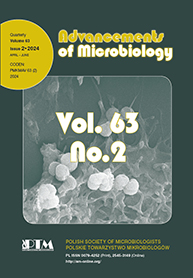1. Wstęp. 2. US3 a uwalnianie kapsydów z jądra komórkowego. 3. Wpływ US3 na ekspresję genów. 4. Wpływ kinazy US3 na cytoszkielet komórki. 5. Rola kinazy US3 w blokowaniu apoptozy. 6. Właściwości immunomodulacyjne białka US3. 6.1. Oddziaływanie z systemami interferonów. 6.2. Wpływ na prezentację antygenów w kontekście cząsteczek MHC klasy I i inaktywacja limfocytów T cytotoksycznych. 6.3. Redukcja ekspresji antygenów wirusowych na powierzchni komórki. 6.4. Wpływ na aktywację limfocytów NKT. 7. Inne funkcje kinazy US3. 8. Podsumowanie
Abstract: Phosphorylation by protein kinases modulates the function of target proteins by interfering with their enzymatic activity, cellular location and/or association with other proteins. Viruses have evolved complex interactions with their hosts and often mimic cellular proteins in order to usurp the cellular machinery for their own benefit, so it is not surprising that vast number of viruses encode protein kinases. Alphaherpesvirus kinase US3 is a conserved multifunctional protein, regulating the egress of viral particles, but also responsible for alterations in cell morphology resulting from the breakdown of actin stress fibers and formation of cell projections. US3 homologs control the trafficking of viral and cellular proteins and inhibit apoptosis. The current review provides an overview of the properties and functions of alphaherpesvirus US3 protein kinase orthologues.
1. Introduction. 2. US3 and the virus egress from the cell nucleus. 3. Effect of US3 on gene expression. 4. Effect of US3 on cytoskeleton. 5. Role of US3 in the blocking of apoptosis. 6. Immunomodulatory properties of US3. 6.1. Interactions with the interferon systems. 6.2. Effect on the MHC class I-restricted antigen presentation and inactivation of cytotoxic T lymphocytes. 6.3. Reduction in the cell surface expression of viral antigens. 6.4. Effect on the activation of NKT lymphocytes. 7. Other functions of US3 kinase. 8. Summary

